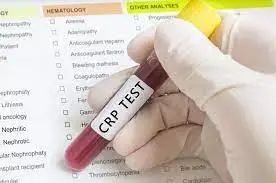- Home
- Medical news & Guidelines
- Anesthesiology
- Cardiology and CTVS
- Critical Care
- Dentistry
- Dermatology
- Diabetes and Endocrinology
- ENT
- Gastroenterology
- Medicine
- Nephrology
- Neurology
- Obstretics-Gynaecology
- Oncology
- Ophthalmology
- Orthopaedics
- Pediatrics-Neonatology
- Psychiatry
- Pulmonology
- Radiology
- Surgery
- Urology
- Laboratory Medicine
- Diet
- Nursing
- Paramedical
- Physiotherapy
- Health news
- Fact Check
- Bone Health Fact Check
- Brain Health Fact Check
- Cancer Related Fact Check
- Child Care Fact Check
- Dental and oral health fact check
- Diabetes and metabolic health fact check
- Diet and Nutrition Fact Check
- Eye and ENT Care Fact Check
- Fitness fact check
- Gut health fact check
- Heart health fact check
- Kidney health fact check
- Medical education fact check
- Men's health fact check
- Respiratory fact check
- Skin and hair care fact check
- Vaccine and Immunization fact check
- Women's health fact check
- AYUSH
- State News
- Andaman and Nicobar Islands
- Andhra Pradesh
- Arunachal Pradesh
- Assam
- Bihar
- Chandigarh
- Chattisgarh
- Dadra and Nagar Haveli
- Daman and Diu
- Delhi
- Goa
- Gujarat
- Haryana
- Himachal Pradesh
- Jammu & Kashmir
- Jharkhand
- Karnataka
- Kerala
- Ladakh
- Lakshadweep
- Madhya Pradesh
- Maharashtra
- Manipur
- Meghalaya
- Mizoram
- Nagaland
- Odisha
- Puducherry
- Punjab
- Rajasthan
- Sikkim
- Tamil Nadu
- Telangana
- Tripura
- Uttar Pradesh
- Uttrakhand
- West Bengal
- Medical Education
- Industry
Patients of depression with high CRP respond poorly to SSRIs: Study

Researchers at first Affiliated Hospital of Zhengzhou University, Henan, China have found in a new study based on data from more than 900 patients that individuals with depression who had high levels of C-reactive protein responded poorly to selected serotonin reuptake inhibitors compared to those with lower CRP levels.
C-reactive protein (CRP) has been shown to predict antidepressant treatment outcomes in several trials, but they were limited to small-sample and strictly-restricted conditions. This study plans to verify if CRP can predict antidepressant efficacy in large samples in the real world.
918 depressed patients who had tested CRP were included, then were followed up through their outpatient visits or by telephone to obtain information about their medication therapy (SSRIs, SNRIs, MT, NaSSA) and assess efficacy using the Clinical Global Impressions–Improvement scale (CGIsingle bondI). Efficacy was classified as effective and ineffective and CRP was separated into the low CRP group (CRP <1 mg/L, n = 709) and the high CRP group (CRP ≥1 mg/L, n = 209). The efficacy was compared in different groups.
Results
- Using Kaplan-Meier survival analysis and Cox proportional regression model to analyze, it was discovered that SNRIs were more effective than SSRIs in treating patients with high CRP and SSRIs were more effective in treating patients with low CRP than those with high CRP while no difference in efficacy between the two groups was found in patients using SNRIs, MT, NaSSA.
- Small amounts of MT and NaSSA were included, and some factors that may affect CRP value have not been controlled.
Thus, CRP could predict the efficacy of SSRIs in the real world, depressed patients with high CRP may be more likely to respond poorly to SSRIs.
Reference:
Yuqian Pan, Rui Luo, Shuqi Zhang, Yuxia Liu, Yiping Wang, Simeng Feng, Hengfen Li. C-reactive protein could predict the efficacy of SSRIs in clinical practice: A cohort study of large samples in the real world, Journal of Affective Disorders, Volume 313, 2022, Pages 251-259, ISSN 0165-0327, https://doi.org/10.1016/j.jad.2022.06.080.
Keywords:
Yuqian Pan, Rui Luo, Shuqi Zhang, Yuxia Liu, Yiping Wang, Simeng Feng, Hengfen Li, C-reactive protein, predict, efficacy, SSRIs, clinical, practice, cohort, study, large, samples, real world, Journal of Affective Disorders
Dr. Shravani Dali has completed her BDS from Pravara institute of medical sciences, loni. Following which she extensively worked in the healthcare sector for 2+ years. She has been actively involved in writing blogs in field of health and wellness. Currently she is pursuing her Masters of public health-health administration from Tata institute of social sciences. She can be contacted at editorial@medicaldialogues.in.
Dr Kamal Kant Kohli-MBBS, DTCD- a chest specialist with more than 30 years of practice and a flair for writing clinical articles, Dr Kamal Kant Kohli joined Medical Dialogues as a Chief Editor of Medical News. Besides writing articles, as an editor, he proofreads and verifies all the medical content published on Medical Dialogues including those coming from journals, studies,medical conferences,guidelines etc. Email: drkohli@medicaldialogues.in. Contact no. 011-43720751


